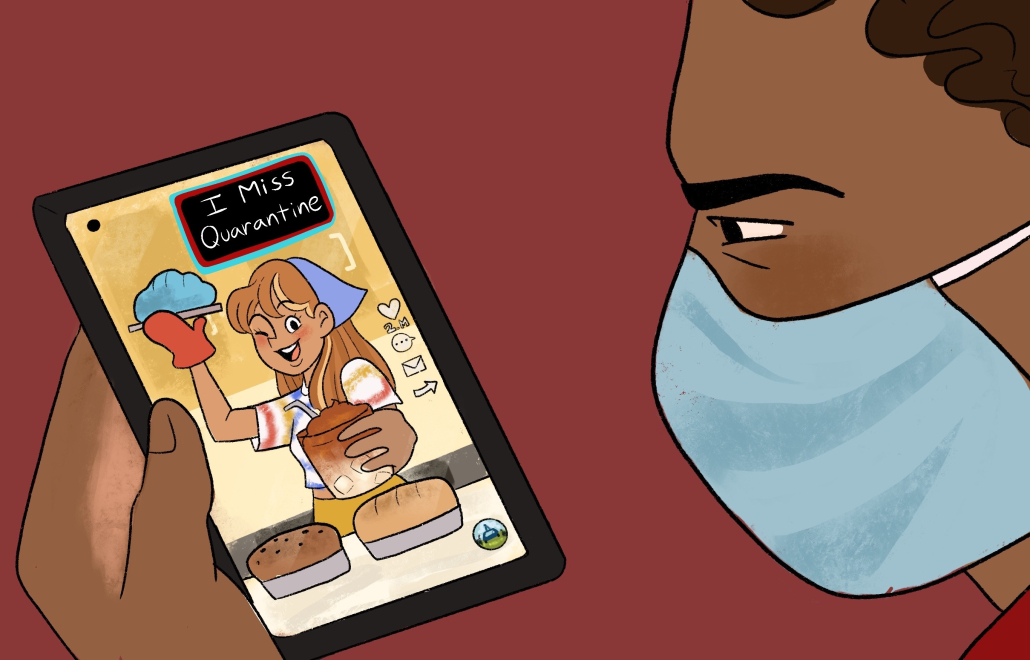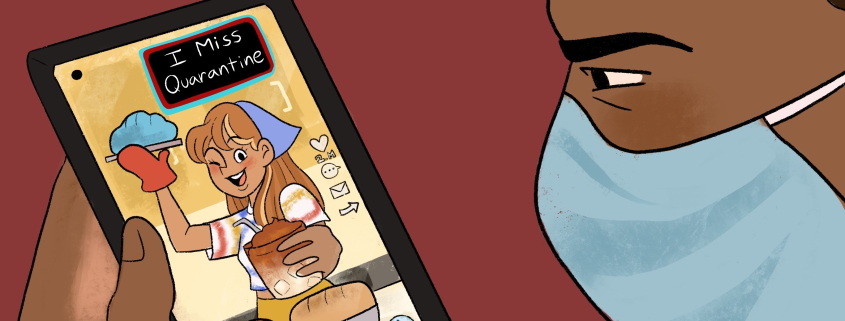‘Missing’ quarantine is a tone deaf take

If nostalgia serves one function, it’s to distort the reality of the past. In the somewhat aftermath of one of the most emotionally, socially and financially taxing years around the world, many have taken to social media to reminisce on the “carefree” times of the initial lockdown.
TikTok user @mafeanzures posted a video of her dancing, accompanied with text on the screen reading, “The way we took quarantine for granted makes me want to cry. There’s literally nothing I miss more than beginning of 2020. Quarantine felt like a well deserved break, time was not real, whipped coffee, this song, so many memories but none at the same time, our only responsibility was to stay home … and yet we still complained.”
Videos with similar — if not the same — sentiment began populating my For You page on TikTok, leaving me disturbed. How could we have all experienced such collective loss but, at the same time, begin romanticizing the pandemic?
Much to my surprise, @mafeanzures’ video alone garnered nearly one million likes. It was painful to witness so many people in the comments agreeing and showing their privilege on social media so shamelessly.
I was not the only one troubled by the increasing frequency of these videos as TikTok user @kattigemowijf commented, “idk why people feel like this. My mental health care stopped, I was terrified, felt trapped, etc” while @sunflwrcake responded, “You ain’t about to romanticize this. The fact nobody took it seriously is why we still here 2 years later.”
The people that have taken to social media to happily reminisce on the dumpster fire we called 2020 are seemingly blissfully unaware of the pain and sacrifices that many working-class individuals endured.
The reality is that the pandemic devastated so many in the United States alone. The uncertainty at the beginning of the pandemic had my family, along with undoubtedly many other working-class families, wishing to stay at home to avoid catching the virus — however, as we all know, bills stop for no one — not even a global pandemic. So with this, three-fifths of my family, including myself, kept showing up to work.
My part-time job at a local business I had previously loved working at quickly became exhausting, anxiety-inducing and eventually the reason for some of my worst memories during the pandemic. Frequently, I was met with rude customers who gave me some of their favorite choice of profanity when I’d ask them to simply adhere to our new lowered capacity or masking policy. My coworkers were stressed knowing that their second and third jobs were closing due to the pandemic — there was hardly any room to be carefree.
While working during the pandemic was a nightmare for many, home life wasn’t any better. School felt pointless, college applications felt like they would never end and isolation became overwhelming. Each day felt monotonous, and the only subject of conversation was the coronavirus or one of its subsidiary branches such as who had died that day.
Though at times I felt like I would die of boredom, I was grateful each day I was with my family. So many fail to realize the privilege it was to stay home during the pandemic. With 985,523 deaths and counting as of April 14 according to the Centers for Disease Control and Prevention, many essential workers could not afford that luxury and had to fight the coronavirus on the front lines.
Even if the enormous loss of life was not a big enough indicator of the hardships during the pandemic, consider the political climate at the time. In the midst of the Black Lives Matter movement and presidential campaigns, Americans — especially people of color — were fraught with the condition of the nation. If a public health crisis on top of a social justice crisis on top of a financial crisis is your idea of a “carefree” time that you wish to go back to, kindly, be my guest — but you must do it in the shoes of the hard-working individuals who carried us through the pandemic.
Videos such as the one described earlier are tone deaf at best, and they should not go uncriticized. Too many people exhausted themselves just to survive the pandemic for upper-middle class TikTokers to discredit their work, completely ignore the condition of the world and blatantly flaunt their privilege. It might have been more than two years since the start of the pandemic, but we cannot ignore the impact it had on all of our lives.

